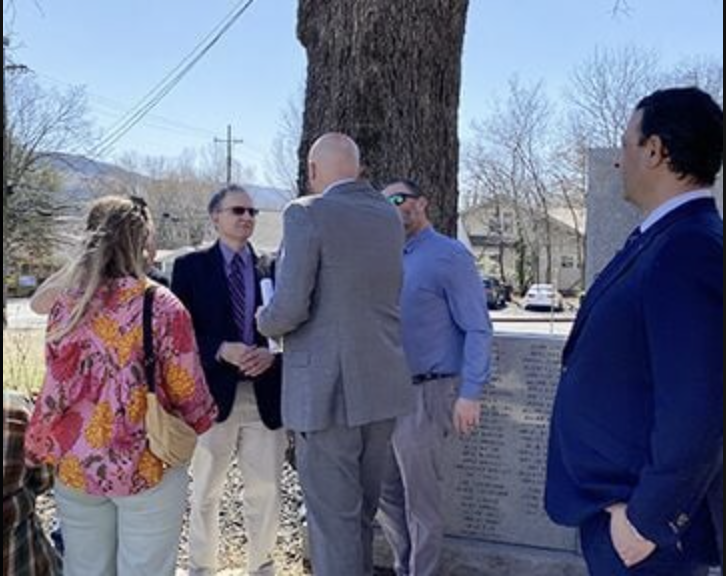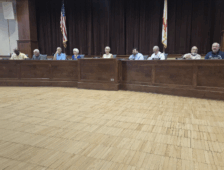Story by Donna Thornton
Jurors could not reach a verdict in the murder trial of Keith Sullivan of Grove Oak, after a total of about 12 hours’ deliberation.
Prior to the jury sending a message to Judge Shaunathan Bell that they were “hopelessly deadlocked,” an already complex case became even more complicated.
Defense attorneys came to court Tuesday with a motion for a mistrial -- claiming one of the jurors should not have been hearing this case.
Sullivan is charged in the May 8, 2023 shooting death of Greg Bagwell. He claimed self-defense, maintaining he was scared for his life and that of his family when Bagwell appeared on his front porch at about 2 a.m.
Defense attorney Nicholas Sparks argued Tuesday morning that Sullivan’s trial has been unfair from the start because a juror — who was selected foreman of the jury — had to have been biased for the prosecution. The juror’s son died of a fentanyl overdose in 2023, and in December, a Crossville man was charged in the son’s death - by the same prosecutors who brought this case against Sullivan. He had reason, Sparks argued, to want to please the district attorney who would be prosecuting the man charged in his son’s death.
“This is on the state,” Sparks argued.
The defense argued prosecutors knew of the juror’s circumstances and relationship with the district attorney’s office and had a duty to reveal them — as did the juror.
District Attorney Summer Summerford said it was up to defense attorneys to ask the questions of jurors that would have revealed that information, and they failed to do so. The state’s duty was to select the best jury to hear its case, she said, just as the defense’s job was to pick the best jury for the defense.
Sparks told Bell the district attorney had an ethical obligation to make the court and defense aware of the issue. He said he believed putting this person on the jury was by design, so the state would have “their” juror on the panel.
Defense attorney Tom Kenniff said even looking at it in the best light, the issue of juror misconduct remained, not only in the failure to disclose a relationship with the district attorney’s office, but also because of Facebook posts from that juror, including the reposting of a comment late Monday or early Tuesday favoring “bringing back the death penalty.”
A mistrial was warranted, Kenniff said, because even if the juror was removed, his participation in deliberations thus far would have “tainted the well.” He said portions of Summerford’s closing statement, given the situation with the juror’s son, seemed to be especially directed toward that juror.
The defense asked for a mistrial with prejudice – meaning the state could not charge Sullivan with the offense again.
The juror was brought before Bell and questioned, and he was allowed to return to deliberations.
A short time later, another juror was brought before the judge.
A courtroom security officer had informed the judge a juror seemed to be making eye contact with the audience, in the area of the courtroom where Sullivan’s family and supporters have been sitting and seemed to be nodding or shaking his head toward them.
The audience was excluded when the juror was brought in — as with the other juror —and afterward, deliberations continued for a while before jurors sent their final message to the judge.
A week after testimony began, it came to an end, with the difficult questions jurors had to consider unresolved.
The arguments
“This case is tragic,” Sparks told jurors during closing arguments, “but it ain’t murder.”
The defense put on no witnesses, though Sparks stressed to jurors he could have called “half of Grove Oak” to testify that Bagwell was a dangerous man.
Throughout the trial, a number of family members and supporters have been in the courtroom to support Sullivan. In months prior, there have been support rallies, and a defense fund to raise money.
“Why wasn’t he in prison?” Sparks asked jurors, referring to Bagwell, and evidence that the state had sought to revoke his bond on another charge within days of the shooting. “What’s going on in this county?” he said, that Sullivan should be scared of Bagwell seeing him go outside to talk to law enforcement officers, fearing revenge.
“Why,” he asked, “is the guy on (Sullivan’s) porch?”
Kenniff said during closing statements he did not believe there was some conspiracy to charge and convict Sullivan. “I don’t think that’s what’s happening.
“Common sense tells you when government gets its mind on something it’s almost impossible to divert it,” he said.
It happens, Kenniff said, because people “fail to see the frailty” of their initial view of a case.
“At some point, it should have become obvious to them that this man is innocent,” he said. Kenniff, from New York, made headlines with a recent successful defense in a self-defense/defense of others case. A man was threatening people on a subway train, and the defendant placed him in a choke hold that proved fatal. He was found not guilty.
“The right to defend yourself applies, whether you’re in the parking lot at Food City or on the subway, and you better believe it applies when you’re sleeping in the sanctity of your own home,” he told jurors.
Sparks told jurors the state wanted them to look at 13 seconds out of Sullivan’s life — the length of the fatal encounter on that early morning, without looking at Bagwell’s reputation and actions before it.
Summerford made note of that 13 seconds.
“It’s also the entire extent of the relationship between the defendant and Greg Bagwell, she said. “It was the last 13 seconds of Greg Bagwell’s life.”
In closing statements, Summerford asked jurors to consider what kind of world we want to live in.
“Do we want to live in a world where the law applies the same and equally to everybody? Or where it differs depending on whether the person is ‘good’ or ‘bad?’ The defense asks you to apply (the law) subjectively,” Summerford said. “That’s not how laws work.”
She said through the trial they kept seeing a list of bad things Greg Bagwell has done. How many items have to be in that list,” she asked, for a person’s life to essentially not matter?” She asked how long items should stay on the list. “Do they roll off?”
Summerford said the defense seemed to argue the law should be kinder to people with a lot of good things in their list. However, she told jurors, the law is supposed to apply to everyone equally.
“Is this the community we want to live in — if you say the magic words ‘I was scared’ you can shoot and kill someone as they’re running away?”
The state medical examinator testified that Bagwell received multiple gunshot wounds to the back, and that there were no drugs or alcohol found in his system at autopsy.
Both sides drew on personal experience, in their appeals to the jury.
Summerford said she had a cousin she grew up with an almost sister-like bond. They were from the same families and backgrounds, but the cousin had problems with mental illness and substance abuse.
“She has a lot of bad things on her list,” the district attorney said, questioning whether that made her life less valuable.
“Every life is valuable; even Greg Bagwell’s,” Summerford said.
Sparks pointed out to jurors the common points between his life and Sullivan’s. Both are husbands, and fathers, among other similarities.
“I am that man,” he said, gesturing to Sullivan.
The aftermath
After the mistrial, or “hung” jury, Summerford issued a statement: “We appreciate the Grand Jury that considered this matter, as well as the jury who sat through a week of testimony and arguments. It is the duty of this office to seek justice for those who have been harmed, regardless of their background. Deciding whether a defendant is guilty of murder is not a task to take lightly. This jury deliberated for some time in trying to reach a verdict, and we appreciate their time and attention.”
With jurors dismissed, Bell asked the state about its intentions with the case going forward. Summerford said the state would prosecute Sullivan again.
Discussion turned then to a date for a re-trial, with Sparks saying he had an expected three-week trial in May, and Summerford noting a capital murder case coming up in September.
Bell put the case on the docket for Oct. 27.





